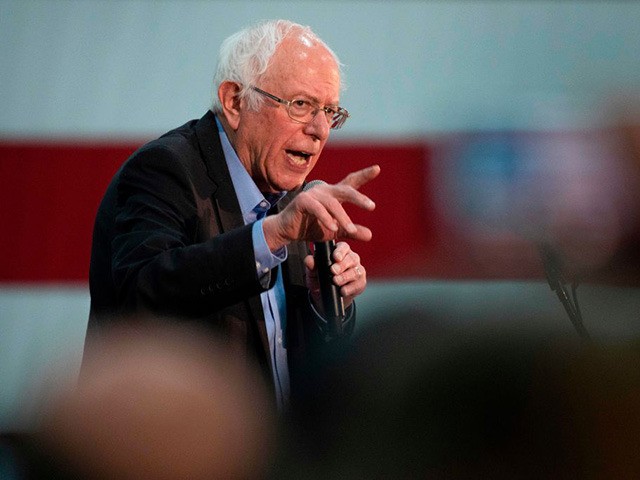Members of the Democrat establishment have demonstrated concern over the potential of Sen. Bernie Sanders (I-VT) running away with the Democrat Party’s nomination, and many superdelegates have signaled that, in the event of a contested convention, they would not immediately throw their support behind him.
The New York Times interviewed 93 superdelegates in recent days and found “overwhelming opposition” to backing the socialist presidential hopeful as the party’s nominee if he fails to enter the party’s convention with a majority of delegates.
A Democrat candidate needs a majority of pledged delegates, 1,991, going into the convention in order for the candidate to secure the nomination on the first ballot. Anything less would result in a contested convention, handing power back to superdelegates, or unpledged delegates, who could defy the will of Democrat voters and throw support behind someone else.
Sanders is the only Democrat candidate who has stated his belief that the candidate going into the convention with the most delegates should be the nominee, regardless if he or she fails to reach the magic number.
Moderate Democrats and establishment party leaders across the board are panicked by Sanders’ rise and the impact it could have down the ballot — from maintaining control of the House to taking over the Senate.
Superdelegates, comprised of many of those party officials and Democrat leaders, share those concerns. The Times spoke to several of the worried Democrat players and found that they are “willing to risk intraparty damage to stop his nomination at the national convention in July if they get the chance”:
Since Mr. Sanders’s victory in Nevada’s caucuses on Saturday, The Times has interviewed 93 party officials — all of them superdelegates, who could have a say on the nominee at the convention — and found overwhelming opposition to handing the Vermont senator the nomination if he arrived with the most delegates but fell short of a majority.
“We’re way, way, way past the day where party leaders can determine an outcome here, but I think there’s a vibrant conversation about whether there is anything that can be done,” said Jim Himes, a Connecticut congressman and superdelegate, who believed the nominee should have a majority of delegates.
The Times found that a “vast” majority of the unpledged delegates believe that no candidate will be able to secure the nomination on the first ballot and noted that “only nine of the 93 superdelegates interviewed said that Mr. Sanders should become the nominee purely on the basis of arriving at the convention with a plurality, if he was short of a majority”:
If you’re wondering whether (1) there is a Dem establishment or (2) it is leery of @BernieSanders: Only 9 of 93 superdelegates interviewed said Bernie should become the nominee purely on the basis of arriving at the convention with a plurality. https://t.co/E9JdbGP2hL
— Kenneth P. Vogel (@kenvogel) February 27, 2020
New York State Democratic Party chairman Jay Jacobs, who happens to be one of the 771 superdelegates, defended the potential scenario of superdelegates backing who they believe will fare better in a general election matchup against President Trump.
“Bernie wants to redefine the rules and just say he just needs a plurality,” Jacobs told the Times.
“I don’t think we buy that. I don’t think the mainstream of the Democratic Party buys that. If he doesn’t have a majority, it stands to reason that he may not become the nominee,” he added.
The Times denies the existence of a “widespread public effort underway to undercut” Sanders — something many of his supporters adamantly disagree with, citing negative TV coverage and unfair treatment in past debates.
Congressional Progressive Caucus co-chair and Sanders supporter Rep. Pramila Jayapal (D-WA) warned it will be “a big problem” if Sanders goes into the convention with the most pledged delegates and the superdelegates defy the will of the people.
“If Bernie gets a plurality and nobody else is even close and the superdelegates weigh in and say, ‘We know better than the voters,’ I think that will be a big problem,” she said.
Rep. Veronica Escobar (D-TX) told the Times that “if 60 percent is not with Bernie Sanders [going into the convention], I think that says something, I really do.”
Only a sliver of pledged delegates have been distributed thus far, but that all changes on Super Tuesday, where 14 states will dole out roughly one-third of the party’s pledged delegates. Most polls indicate Sanders leading in delegate-rich states like California and even Texas. Nonetheless, the allocation process — distributing pledged delegates based on the percentages of support — could increase the scenario of a contested convention. It remains unclear if superdelegates will ultimately deviate from the will of Democrat voters if Sanders, who currently leads in pledged delegate totals, heads into the convention with a plurality rather than a majority.
Sanders has done little to address the mounting concerns over President Trump taking advantage of the presidential hopeful’s socialist label. He told ABC host George Stephanopoulos during the February 7 Democrat debate that voters should not be worried because “Donald Trump lies all the time.”
Asked why Democrats shouldn't be worried about Pres. Trump's attacks on him with the "socialist" label, Bernie Sanders says, "Because Donald Trump lies all the time." https://t.co/Rhy9aOaDTU #DemDebate pic.twitter.com/nzto98Fkpj
— ABC News (@ABC) February 8, 2020
“At the end of the day, the way we defeat Donald Trump — and everybody up here, by the way, is united no matter who wins this damn thing. We’re all going to stand together to defeat Donald Trump,” he added.

COMMENTS
Please let us know if you're having issues with commenting.